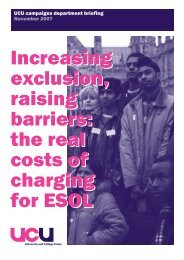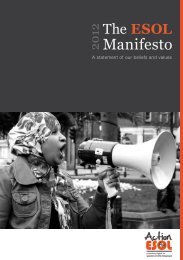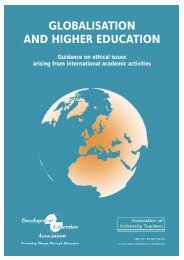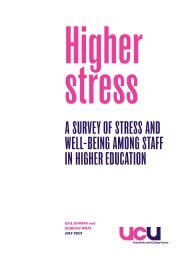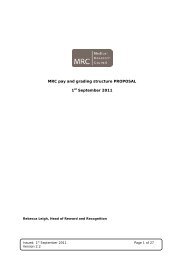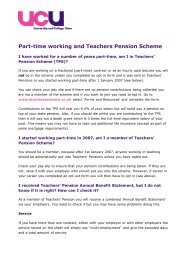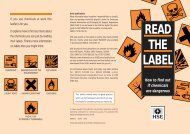zimbabwe - UCU
zimbabwe - UCU
zimbabwe - UCU
Create successful ePaper yourself
Turn your PDF publications into a flip-book with our unique Google optimized e-Paper software.
ZIMBABWEarrest, torture, killings and attacks on supporters of thepolitical opposition, human rights defenders and theindependent media. Police and other security forces havetargeted members of the political opposition, lawyers, journalistsand civil society groups, including the ZimbabweCongress of Trade Unions (ZCTU), the National ConstitutionalAssembly (NCA) and Women of ZimbabweArise (WOZA).’ (Amnesty International Canada2009 234 )2008 presidential elections In 2008, elections returned theMovement for Democratic Change (MDC) and ZANU-PFwith 30 seats each in the Senate. At the House of Assembly, MDCwas returned with 109 seats and ZANU-PF with 97 (ZimbabweElection Commission 2008 235 ). Morgan Tsvangirai ofthe MDC won the first round of the presidential poll butwithdrew from the second round following severe irregularitiesand political violence levelled at MDC members. In aspeech given in June 2008, Tsvangirai withdrew stating that:‘Zanu PF militia dressed in army regalia have beendeployed to spearhead the terror campaign in the ruraland urban areas. Armed Zanu PF youths are waging aterror campaign and have vowed that the MDC will notrule the county even if it wins. Zanu PF has set up over3000 militia bases across the length and breath of thecountry in order to cow and intimidate MDC supportersinto submission. Death and hit squads are on the loose inall the provinces. War veterans and Zanu PF youths aremanning illegal roadblocks with impunity in complicitywith the police. The use of guns and arms of war by ZanuPF militia and war vets to campaign for Zanu PF hasvirtually militarized the election atmosphere. All this isbeing done as State sponsored ploy to tilt the vote infavour of Zanu PF…Given the totality of these circumstances, we believe acredible election, which reflects the will of the people isimpossible. We remain unreservedly committed to freeand fair elections in the country. The conditionsprevailing as of today do not permit the holding of acredible poll’ (MDC 2008 236 ).A power sharing agreement signed on 11 September 2008between MDC and ZANU-PF provided for a government ledby Mugabe as President and Tsvangirai as Prime Minister.Both the African Union and the South African DevelopmentCommunity (SADC) have supported the initiative as aworkable interim solution (African Union 2008 237 ). Thegovernment assembled in February 2009 and intends tocomplete a referendum on a new constitution by the end of2010 (CIA 2009 238 ).Although a Global Political Agreement (GPA) defines theterms under which the new government shares power, therehave been recent reports that its implementation may be slowand subject to political interference (Zimbabwe Independent2009 239 , Change Zimbabwe 2009 240 ). One specific concern isthe reported use of violence and summary imprisonmentagainst MDC officials. It has been reported that this is aZANU-PF tactic to force an amnesty agreement that wouldcover crimes committed over the previous twenty years(UNHCR 2009 241 ).Economic collapse Zimbabwe’s economy has undergone asevere collapse in the past decade. An HIV rate of around20%, involvement in the Democratic Republic of Congo war,extensive/costly land reform policies, a cholera epidemic andsanctions have contributed to an unemployment rate of 80%in the formal economy and an inflation rate of 11.2 million%in 2008 (CIA 2009 242 ). As a result, many Zimbabweans subsistin the informal economy without recourse to welfare schemes(ILO 2008 243 ) and the US$ has replaced the Zimbabwe dollar(Z$) as the functional unit of currency (STERP 2009 244 ). Theconsequences for education have been profound, with recentreports that most households are unable to afford the statesector tuition fee of between Z$20 and Z$280 a term(Zimbabwe Sunday Mail 2009 245 ).In 2000, Mugabe embarked on a land distributioncampaign whereby white farmers were required to relinquishtheir farms to designated ‘war veterans’. The turmoil in theagricultural sector lead to a severe reduction in foodproduction, a situation which produced both domestic foodshortages and a reduction in export volumes. The World FoodProgramme has estimated that 4 million people a month60


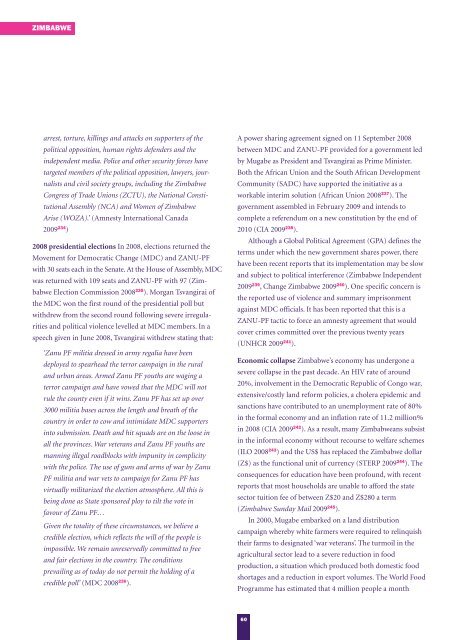
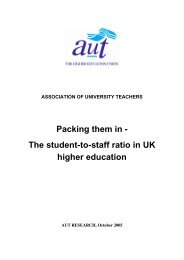
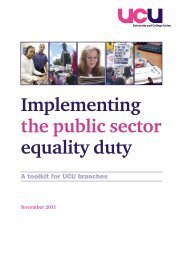

![(.pdf) [29kb] - UCU](https://img.yumpu.com/50914942/1/184x260/pdf-29kb-ucu.jpg?quality=85)


